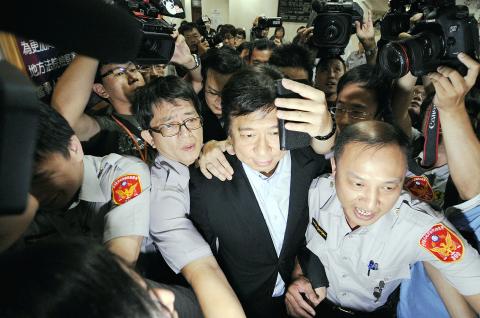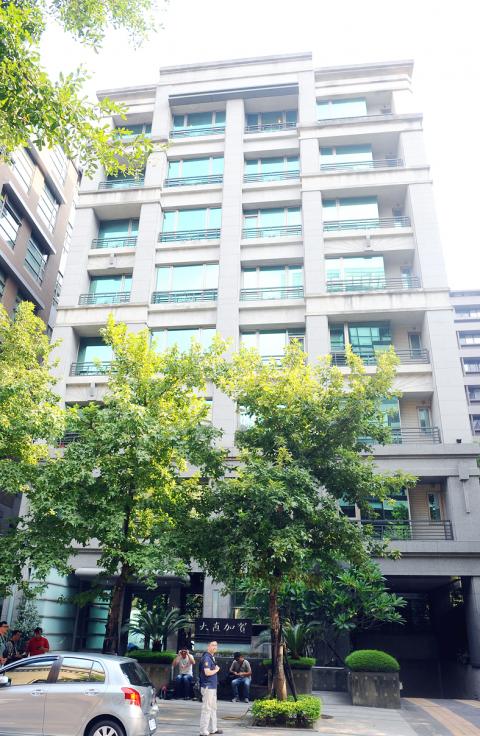Former Mainland Affairs Council (MAC) deputy minister Chang Hsien-yao (張顯耀) was yesterday summoned for questioning on suspicion of leaking state secrets related to cross-strait negotiations with China, while the Ministry of Justice’s Investigation Bureau approved a search warrant for Chang’s residence in Taipei’s Dazhi District (大直) and six other locations.
Taipei prosecutors also questioned three other people, one of whom was reportedly Chang’s assistant, Chen Hung-yi (陳宏義).
They were questioned as witnesses.

Photo: Chen Chih-chu, Taipei Times
The questioning was still ongoing at press time last night.
Taipei District Prosecutors’ Office spokesman Huang Mo-hsin (黃謀信) refused to reveal the identities of the three witnesses.
The office had summoned the council’s economic affairs department director Lee Li-jane (李麗珍), planning department director Hu Ai-ling (胡愛玲) and politics and legal affairs department director Yeh Ning (葉寧) on Tuesday night for questioning after it found discrepancies in some of the available data.

Photo: Chang Chia-ming, Taipei Times
Prosecutors yesterday said that Chang has been restricted from leaving the country since Friday last week, adding that the case has been reclassified from code Ta (他) to code Zhen (偵).
According to legal practice, filing cases under code Ta indicates that prosecutors consider the person’s conduct to be suspect, but lack sufficient evidence to prove that the person is a criminal. Code Zhen indicates that legal grounds for suspicion have been established, but not enough to lay charges.
Sources also said that the national security investigators had discovered Chang leaking secrets three years ago, adding that the Mainland Affairs Council’s proof came from a wiretap on Chang.
If allegations of leaking secrets are substantiated, the district prosecutors’ office would continue the investigation if the secrets did not involve national security, the sources said, but the case would be forwarded to the Taiwan High Court if the secrets are confirmed to be linked to national security.
Separately, on questions of whether the national security system had legally obtained permission to wiretap Chang, Taiwan High Court spokesman Tsai Chung-tun (蔡炯燉) said the case had been deemed top secret and only the judge who approved the wiretap knew about the matter.
Tsai added that the court could not offer any other answer even if the queries came from the Control Yuan or the Legislative Yuan.
The concern over illegal wiretapping stemmed from the Special Investigation Division’s alleged wiretapping of the Legislative Yuan switchboard and multiple legislators during what was deemed a political scheme to oust Legislative Speaker Wang Jin-pyng (王金平) from his post in September last year by President Ma Ying-jeou (馬英九).
Meanwhile, Huang said Chang has refused to submit to questioning by the Investigation Bureau and stated he would answer only to the district prosecutors’ office, while the other three witnesses were making their statements at the bureau.
The office does not rule out filing a request to detain Chang, Huang said.
Additional reporting by Lin Ching-chuan, Chien Li-chung, Yang Kuo-wen and Peng Hsien-chun

CHAOS: Iranians took to the streets playing celebratory music after reports of Khamenei’s death on Saturday, while mourners also gathered in Tehran yesterday Iranian Supreme Leader Ayatollah Ali Khamenei was killed in a major attack on Iran launched by Israel and the US, throwing the future of the Islamic republic into doubt and raising the risk of regional instability. Iranian state television and the state-run IRNA news agency announced the 86-year-old’s death early yesterday. US President Donald Trump said it gave Iranians their “greatest chance” to “take back” their country. The announcements came after a joint US and Israeli aerial bombardment that targeted Iranian military and governmental sites. Trump said the “heavy and pinpoint bombing” would continue through the week or as long

TRUST: The KMT said it respected the US’ timing and considerations, and hoped it would continue to honor its commitments to helping Taiwan bolster its defenses and deterrence US President Donald Trump is delaying a multibillion-dollar arms sale to Taiwan to ensure his visit to Beijing is successful, a New York Times report said. The weapons sales package has stalled in the US Department of State, the report said, citing US officials it did not identify. The White House has told agencies not to push forward ahead of Trump’s meeting with Chinese President Xi Jinping (習近平), it said. The two last month held a phone call to discuss trade and geopolitical flashpoints ahead of the summit. Xi raised the Taiwan issue and urged the US to handle arms sales to

State-run CPC Corp, Taiwan (CPC, 台灣中油) yesterday said that it had confirmed on Saturday night with its liquefied natural gas (LNG) and crude oil suppliers that shipments are proceeding as scheduled and that domestic supplies remain unaffected. The CPC yesterday announced the gasoline and diesel prices will rise by NT$0.2 and NT$0.4 per liter, respectively, starting Monday, citing Middle East tensions and blizzards in the eastern United States. CPC also iterated it has been reducing the proportion of crude oil imports from the Middle East and diversifying its supply sources in the past few years in response to geopolitical risks, expanding

Pro-democracy media tycoon Jimmy Lai’s (黎智英) fraud conviction and prison sentence were yesterday overturned by a Hong Kong court, in a surprise legal decision that comes soon after Lai was jailed for 20 years on a separate national security charge. Judges Jeremy Poon (潘兆初), Anthea Pang (彭寶琴) and Derek Pang (彭偉昌) said in the judgement that they allowed the appeal from Lai, and another defendant in the case, to proceed, as a lower court judge had “erred.” “The Court of Appeal gave them leave to appeal against their conviction, allowed their appeals, quashed the convictions and set aside the sentences,” the judges